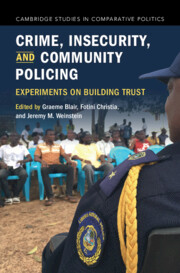14 - Conclusion
from Part III - Reflecting on Community Policing
Published online by Cambridge University Press: 09 December 2024
Summary
This chapter discusses how to interpret the findings from six randomized experiments on community policing, and the implications for policymaking and police reform. The bottom line is that locally appropriate increases in the strength of community policing practices do not generate the changes to trust in the police, citizen cooperation, or crime reduction that we hypothesized or that its advocates claim. The evidence suggests, at a minimum, that caution should be exercised in advocating for the adoption or continuation of community policing in the Global South. New evidence may emerge that shows community policing can be effective in a different type of context, when implemented in response to demands from a social movement of citizen groups, with a different set of institutional preconditions, or in combination with other reforms, such as citizen accountability boards. Until it does, we suggest that it be deprioritized in the list of policy levers to reduce crime and build trust in police in the Global South.
Keywords
- Type
- Chapter
- Information
- Crime, Insecurity, and Community PolicingExperiments on Building Trust, pp. 511 - 524Publisher: Cambridge University PressPrint publication year: 2024

